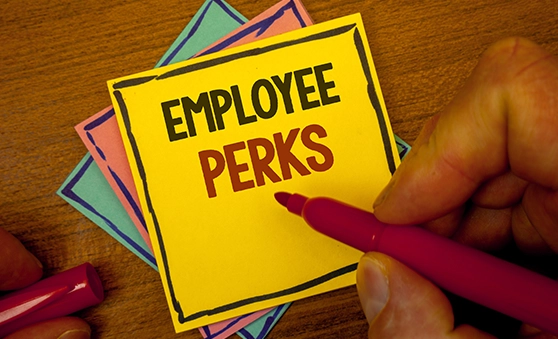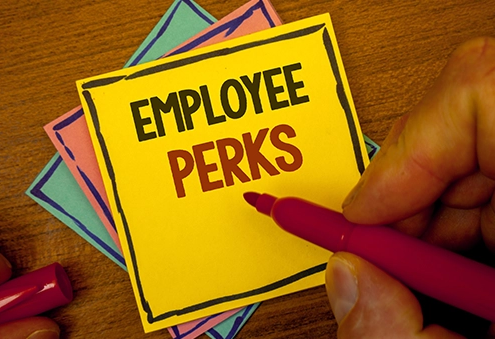50 Employee Perks to Offer Staff
Businesses will use all kinds of incentives to encourage staff to work well. These efforts lead to better personal development, higher work output, and greater business success.
A popular way to achieve this is by using an employee perk. However, they only work well if people find them interesting enough to aspire to them.
Whether you’re rewarding new starters or those on your recognition scheme, these perks can help motivate and retain great workers. Let’s look at some of the best employee perks and benefits to use in your business:
Financial perks
1. Bonuses
Most people would work more if given bonuses. Bonuses show instant appreciation for hard work and efforts – making them a great perk to offer.
2. Commission
Commission perks are often earned by individuals or entire teams. They promote friendly competitiveness between peers; but in the end, the business wins!
3. Profit shares
Profit shares aren’t just for those in senior roles. Many businesses use them to promote their retention rates, specifically for their high-flyers.
4. Student loan reimbursements
Student loan reimbursements are great perks for employees with ongoing debt. It’s incentives like these that can make a difference in their personal lives.
5. Access to salary early
We’ve all been in situations where we could do with a little more cash. Having access to our salary early can eliminate all kinds of financial penalties and late fines.
Health and wellness perks
6. Gym membership discounts
Going to the gym isn’t just good for our physicality, it also helps our mental state. From fitness classes to yoga sessions, these healthy perks provide something for everyone.
7. Therapy sessions
Whether it’s financial troubles or bereavement issues, therapy can help people in times of need. Perks like these vastly improve employee well-being, as well as personal welfare.
8. Meditation rooms
Meditation rooms provide a space to escape the stresses of life. Employees can use these perks to pray, meditate, or simply decompress for an hour or two.
9. Nap rooms
Nap rooms are popping up in more workplaces today. Studies show a 20-minute power nap can do wonders for our health. Just be sure to include alarm clocks with these perks!
10. Wellness programs
Wellness program perks cover all kinds of fields; like therapy, exercise, and even addiction programs. Remember, privacy and confidentiality are paramount in these spaces.
Career progression perks
11. Promotions
An extremely common perk used to encourage hard work is promotions. These often include higher positions, increased salaries, and greater benefits.
12. Work mentoring
Some employees are motivated by being able to grow professionally. That’s why work mentoring perks are a must in all businesses.
13. Ambassadors
When employees are constantly over-achieving, try promoting them as your brand ambassador. They’ll be able to represent your business values with authenticity and pride.
14. References
Nothing’s more eye-capturing in CVs than a glowing reference. Don’t just save these for existing employees. Offer this perk as part of your career progression program.
15. Paid training
Many businesses actively help their staff develop their skills and talents. Paid training courses are an ideal perk to have and work in almost any kind of workplace.
Annual leave perks
16. Extra paid holidays
Most UK employees are entitled to 25 paid holidays per year. But, who wouldn’t want a few more? Perks like these lead to greater engagement, motivation, and loyalty.
17. Additional sick leave
Most employees receive five paid sick days per year. If you give more, provide perks to deserved employees or across your entire workforce.
18. Late starts and early finishes
Nothing inspires employees to work harder than being able to finish early and start late. Just be sure these perks don’t interrupt the flow of your business productivity.
19. Birthday off
A personalised perk you can offer employees is having their birthday off. Roll this out across all your staff for a more caring touch.
20. Four-day working week
This new fad has its ups and downs; but if it works for you, give it a shot. Again, ensure this perk doesn’t end up costing your business.
Workplace perks
21. Flexible working
Many candidates actively seek jobs that offer flexible working. You definitely can’t afford to ignore these employee perks at work. Or else you’ll lose candidates to rival businesses.
22. Personalised parking
Parking perks aren’t just for senior staff or the CEO. Offer it to employees who’ve truly worked exceptionally in recent times or projects.
23. Extra parental leave
It’s so important for employees to have a healthy work-life balance. Extra parental leave perks allow this – ensuring they never miss out on another family milestone again.
24. Ergonomic furniture
A great workplace perk to offer is ergonomic furniture. Reclining seats, blue-light-blocking glasses, and gel rest pads – they all help employees work in safer and more comfortable environments.
25. Shared kitchen appliances
Make employees feel at home with shared kitchen appliances. Toasters, microwaves, fridges, ice machines – they’ll never worry about being hungry at work again.
Food and drink perks
26. Healthy snacks
Fruit baskets, juice dispensers, cereal pantries – healthy snacks are a great perk to keep your workforce fueled with energy.
27. Free breakfast
We all work better on a full stomach, so imagine the potential of your workforce. Why not offer free breakfast as an employee perk? Do it every day or as a special reward.
28. Happy hours
Many businesses host happy hours; either after reaching certain goals or as a Friday treat. Just be sure to cater to employees who don’t drink alcohol for religious or personal reasons.
29. Food delivery discounts
In an age where food delivery is the norm, why not offer discounts to help employees save on these extra charges?
30. Celebratory lunches
Round up the team and celebrate work achievements with a free lunch. You can book a fancy place for a real treat, or order in for an office party.
Recognition perks
31. Company newsletter
Being recognised for hard work is a perk that helps improve our self-esteem and drive. A great way to do this is through shout-outs in company newsletters.
32. Employee of the month
Having an ‘employee of the month’ scheme can inspire employees to work hard. You’ll soon be struggling to pick only one person for this perk!
33. Gifts cards
There are all kinds of gift cards out there – making them a versatile employee perk! Pick ones that everyone will love; or something related to their interests for a personal touch.
34. Awards evenings
Many businesses host awards evenings to showcase their greatest achievements. What a great place to recognise your employees’ diligence, loyalty, and above all, efforts.
35. Dinner with the CEO
These perks allow employees to receive great career advice. Not to mention, this type of recognition is pretty hard to top.
Discount perks
36. Commute discounts
Trains, buses, trams – many employees use public transport to get to work. To deal with the costs, offer discounts on travel commutes as the perfect perk.
37. Driving discounts
Car owners are constantly adding up the costs of driving to work. Tailor your perks to help with fuel costs, parking tokens, and even vehicle maintenance.
38. Technology discounts
Whilst this may be work-related, providing new tech and apps can be especially helpful for certain employees. Not only can it make work easier, but it can also extend their skills.
39. Accommodation discounts
In some industries, employees are required to stay near their workplace, or even live onsite. If you don’t offer free accommodation, set up discount perks to help cover rental costs.
40. Company cars
A super popular perk that many businesses offer is company cars. However, make sure employees comply with relevant driving regulations or you could end up facing costly fines.
Family-related perks
41. Emergency childcare
Childcare fees are some of the most expensive household bills we have. Offering employee perks for these can really take a load off their mind, as well as their bank balances.
42. Bring your pet to work day
There’s nothing more fun than playing with pets in the office. They can help encourage happiness and relaxation. Just be sure to check for allergies before initiating this perk.
43. Workplace crèche
Having a family-friendly crèche at work is such an attractive feature to own. Perks like these allow employees to avoid the stresses of school commutes.
44. Wedding gifts
Nothing’s better than receiving gifts to commemorate weddings. Send employees wedding gifts to show congrats for their big day.
45. Fertility and adoption support
Employees who are thinking of having children deal with all kinds of stress. Be supportive by offering fertility or adoption support perks, like paid leave or references.
Social-related perks
46. Social tickets
There’s a ticket to an event that’ll just about suit everyone’s taste. That’s why it’s a fool-proof employee perk to offer your hard-working staff.
47. Office parties
Office parties allow employees to celebrate work achievements together. Try to schedule them after pinnacle moments or when your teams need an additional boost.
48. Team-building exercises
A great perk to offer employees is team-building exercises. Schedule these creative employee perks on a weekly basis or send them off for the weekend if and when needed.
49. Charity donations
It’s very common for some employees to raise money or awareness for charities they support. Why not match them pound for pound and double their donations as a work perk?
50. Cultural celebrations
Eid, Hanukkah, Diwali – there are so many cultural festivals celebrated in Britain. Be an inclusive business and enjoy innovative employee perks together! The perfect excuse for a ‘knees-up’!
Contact Love2shop for our awesome corporate perks!
Here at Love2shop, we have the everyday benefits card, which gives employees discounts on big brands. Contact us for more details.









